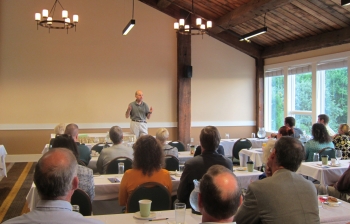Yesterday, Acting U.S. Commerce Secretary Rebecca
Blank traveled to Chicago, Illinois to deliver remarks
at the International Manufacturing Technology
Show (IMTS), hosted by the Association for Manufacturing Technology. Acting
Secretary Blank discussed the importance of manufacturing to boosting U.S.
economic growth, job creation and exports and highlighted the administration's
continuing efforts to build things here and sell them everywhere.
Blank noted that President Obama has been committed to U.S.
manufacturing since his very first day in office, and shared three key
facts that show manufacturing is making a comeback. First, after a decade when America
lost six million manufacturing jobs, we’ve now added more than a half million
back since January 2010. These are good-paying jobs that strengthen economic
security for the middle class. Second, our manufacturing output is up 20
percent since 2009–with big growth in areas like cars and car parts. Third,
manufactured exports have increased in nearly all industry categories, jumping
over 36 percent from 2009 to 2011.
After finishing her remarks, Blank toured the floor
exhibits. She stopped by the Local Motors
exhibition to hear about their crowd-sourced car. The Defense Advance Research Project Agency
challenged Local Motors, a small company based in Chandler, Arizona to design a
vehicle in four weeks and build it in three months. To meet this deadline Local Motors
crowd-sourced the vehicle design, selected one of the over 162 high-quality
designs that came in and then built it ahead of schedule.
Acting Secretary Blank departed IMTS and traveled to Cree-Racine in Racine,
Wisconsin, a local manufacturer of energy-efficient LED lights. They recently
formed a partnership with a distributor in India and last year won the President’s E-Award for their success
in increasing exports. Because of that success, they’re expanding their
facility and creating nearly 500 more jobs in Wisconsin.
Acting Secretary Blank then traveled to Milwaukee,
Wisconsin, where she spoke
with local business leaders about steps that can be taken to grow the American
economy and create jobs. Her remarks focused on the importance of
increasing consumer spending, spurring innovation in manufacturing, increasing
business investments in the U.S., and growing U.S. exports. She drew attention to
a joint venture between five federal agencies, the Departments of Defense,
Energy, and Commerce, the National Science Foundation, and NASA, and local manufacturers for a pilot
project that is focused on additive manufacturing.
Additive manufacturing, often referred to as 3D printing, is
a new way of making products and components from a digital model, and will have
implications in a wide range of industries including defense, aerospace,
automotive, and metals manufacturing. Like an office printer that puts 2D
digital files on a piece of paper, a 3D printer creates components by
depositing thin layers of material one after another using a digital blueprint
until the exact component required has been created. The Department of Defense envisions
customizing parts on site for operational systems that would otherwise be
expensive to make or ship. The
Department of Energy anticipates that additive processes would be able to save
more than 50 percent energy use compared to today’s "subtractive" manufacturing
processes.
This pilot institute will set a research agenda, driven by
private sector needs. It will encourage researchers and entrepreneurs to take
risks, test prototypes, fail quickly and get back up to try again. This is a
great public-private partnership, with funding from the Federal government, two
states and many manufacturers. The Department is tracking this pilot closely,
to learn how best to help fund and establish these sort of public-private
collaborations all over the country.
In addition to highlighting manufacturing, Blank outlined steps
needed to grow the American economy and create jobs. She focused on the
importance of increasing consumer spending, increasing business investments in
the U.S., and growing U.S. exports. She also highlighted the need for
U.S. investments in infrastructure and education to build an economy to last.











